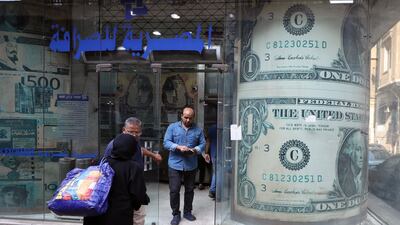The Egyptian pound hit a new low on Sunday, three days after it was devalued by about 15 per cent, depreciating to 24 against the US dollar by the close of business.
The government of President Abdel Fattah El Sisi, sought to calm nerves after the pound's slide, publishing figures showing the strategic reserves of main staples, including wheat, would last for up to six months.
Egypt on Thursday said it was adopting a system that allows the value of the pound to be determined by supply and demand.
That met a key demand by the IMF through months of negotiations that came to fruition last week with a deal for a $3 billion loan from the Washington-based lender.
Egypt is also set to receive $5bn from international backers and another $1bn from a newly created sustainability fund, the IMF said.
Egypt’s economy has struggled to weather the fallout from the Russia-Ukraine war, with its imports bill soaring, particularly for food and fuel, and the swift outflow of about $25bn from its once-lucrative debt market.

The pound closed on Thursday at about 22.5 to the dollar. It was trading about 19.6 before the devaluation, the second such move since March and the third in the past six years.
The falling value of the pound — 35 per cent since March — is almost certain to fuel inflation, which was already about 15 per cent in September, hitting hard most of Egypt’s 104 million people.
Analysts believe the pound’s value will continue to slide before it settles at about 25 to the dollar by the end of the year.
The return of investors to the country’s debt market, higher revenues from tourism and investments from its Gulf Arab allies could bring stability to the currency in 2023, they say.
Mr El Sisi’s government, meanwhile, announced on Sunday that, as of now, the country’s reserves of wheat would meet demand until April, the start of the local harvest season.
There is enough sugar in storage to meet demand until February and cooking oil until May. Egypt is self-sufficient in rice, another staple.

Egypt is often the world’s largest wheat importer — 13 million tonnes on average — and has dealt with soaring prices on world markets after the Russia-Ukraine war broke out in February.
Prices later decreased but there is a likelihood now that they will rise again after Russia suspended an agreement to allow major grower Ukraine to export the grain from its Black Sea ports.
Egypt had relied on the two warring nations for about 80 per cent of its wheat imports, which are key to meeting domestic demand for bread sold at heavily subsidised prices to about 60 million low-income people.

Mr El Sisi went to great lengths last week to explain the woes of the economy to Egyptians, giving a two-hour address at an economic conference on Tuesday and phoning in a night-time talk show for 90 minutes.
His comments were mostly a defence of his economic policies against critics who have questioned his government’s spending priorities.
They have singled out some of the larger mega projects on which it has embarked, such as building about 30 cities, including a smart city in the desert east of Cairo, which will become the nation’s capital.
Mr El Sisi has shot back, saying the projects created millions of jobs and prepared the country for growth and a surge in investments.
“The problem with this country is that its economic resources cannot afford good services in the various sectors,” he said last week of education and health.
But Mr El Sisi acknowledged that Egyptians had endured enough hardship since he embarked on economic reforms in 2016.
They included new taxes, higher charges for services and utilities, and lifting state subsidies on fuel, potable water and domestic electricity.
“Our situation does not permit us to increase their burden. On the contrary, we need to expand our social protection umbrella,” he said.
Mr El Sisi was referring to multibillion dollar programmes his government introduced to protect Egyptians from the effects on the economy brought about by the coronavirus and the Russia-Ukraine war.


